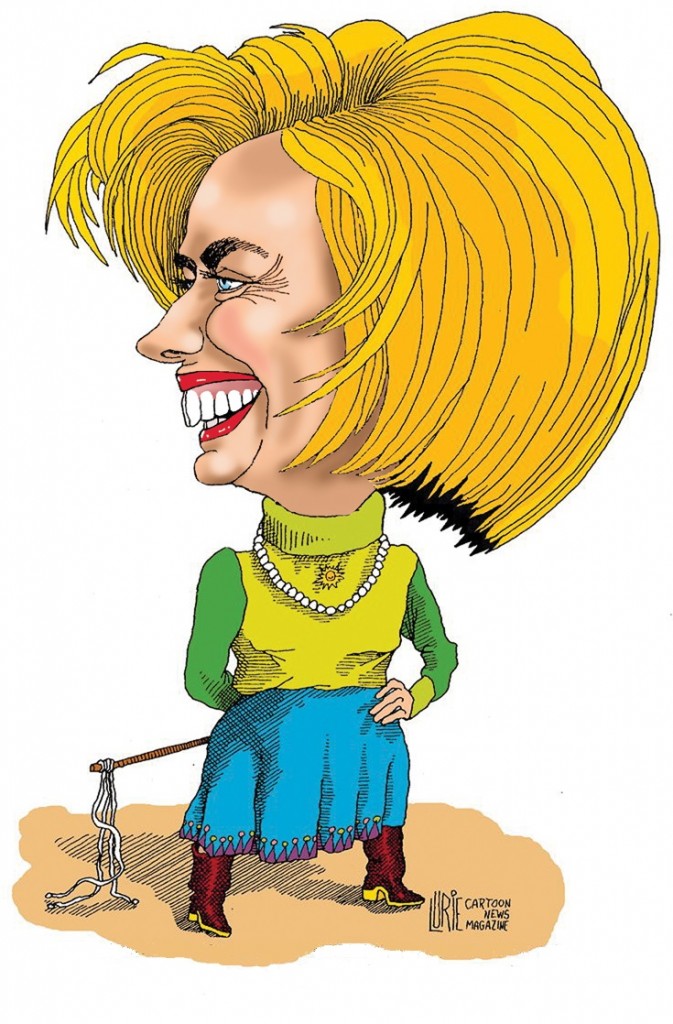It’s an interesting parlor game to ask what presidents would be doing if they weren’t politicians. Ronald Reagan would be a retired actor, and we would all enjoy his stories. George H.W. Bush would be a senior vice-president of an old Fortune 500 company and live in Greenwich or Darien. Bill Clinton would own a bunch of car dealerships. George W. Bush would have made some money from fracking. Barack Obama would be a law school professor and MacArthur Fellow winner.
Hillary Clinton, had she never gone into politics, would be a philanthropoid. She has the proper educational credentials, the correct political opinions, and the nails-scraping-the-chalkboard desire to constantly tell the little people how to live. Think of her good friend Judith Rodin and how she became head of the Rockefeller Foundation and you could see Hillary Clinton’s potential career in nonprofits.
If Hillary Clinton really is going to be our next president, we need to know more about her role in the Clinton Foundation. Thomas Frank does so in this article from Harper’s Magazine, excerpted from his forthcoming book Listen, Liberal.
As I noted in this article on the MacArthur Fellowships, Frank is the sort of leftist who thinks that conservatives are either fools, dupes, or wholly owned subsidiaries of billionaires. As a reactionary, it’s my duty to give Frank hives. What you should know is that Frank hates the Clintons even more than he despises conservatives—and many of his criticisms of the Clinton Foundation make good sense.
Frank went to a Clinton Foundation “production” about aiding women in the Third World that was held in New York City in March 2015. He calls the event a “production” because no one on the panel disagreed with each other and no one from the audience was allowed to ask questions.
Those of us who think of the Clinton Foundation as an organization where the great and the good pay a lot of money to tell each other how special they are will have our worst suspicions confirmed by Frank’s report. He writes:
“When someone’s ‘potential’ was mentioned, it was described as ‘boundless.’ People’s ‘stories’ were ‘compelling’ when they weren’t ‘inspiring,’ ‘incredible,’ or ‘incredibly inspiring.’ A Kenyan activist was introduced as ‘the incomparable.’”
He quotes from a speech by Chelsea Clinton:
“Every year, millions and millions of women everywhere are empowering themselves and their communities by finding unique, dynamic, and productive ways to enter the workforce, start their own businesses, and contribute to their economies and their countries.”
Excellent speech, Chelsea! What a bright young woman you are. You know how to pack all the clichés in one sentence. The human resources directors at the Ford, Rockefeller, MacArthur, Carnegie, and Pew foundations would love to talk to you.
Denouncing the “microclimate of goodness that always seems to surround Hillary Rodham Clinton,” Frank then smacks the ball into the upper deck:
“Regardless of who leads it, professional-class liberalism seems to be travelling on a quest for some place of greater righteousness. It is always engaged in a search for some subject of overwhelming, noncontroversial goodness with which it can identify itself, and under whose umbrella of virtue it can put forward its self-interested class program.”
In the 1990s, Frank says, liberals wanted to save the children, and Hillary Clinton wrote It Takes a Village because, well, who could be against kids? Now they like microfinance because, well, who could be against struggling women in the Third World starting their own businesses and becoming successes?
Well, Thomas Frank doesn’t like microfinance, possibly because the Clinton Foundation, Wal-Mart, and Goldman Sachs have funded women entrepreneurs in the Third World. He quotes someone named Milford Bateman, whose 2010 book Why Doesn’t Microfinance Work? apparently shows that women getting microfinance loans mostly end up getting in debt and poorer than before.
I’m not going to address Bateman’s arguments, except to link to this post from David Roodman of the Center for Global Development, who claims that Bateman fudged his data. However, it wouldn’t surprise me if objective analysis shows that 90 percent of microfinance loans fail, because 90 percent of all new enterprises fail. But giving money to the talented tenth of Third World entrepreneurs is a good thing.
Where Thomas Frank is right is that these microfinance grants come with a lot of baggage, and the baggage comes from program officers who feel compelled to show how special they are for unearthing these noble women. As women like to say, “It’s not you, it’s me,” and the Clinton Foundation event seemed full of many, many, mes.
Frank seems to me to be a minor league Christopher Hitchens. Hitchens, as far as I know, was always a socialist, but no one was better in addressing the many faults of the Clintons. I fondly remember a conference The American Enterprise held in 2000 where Hitchens, holding something amber in his glass at 9 AM, gave an off the cuff speech on all the problems of Bill and Hillary Clinton that was both brilliant and really funny. Frank tees off on the Clintons in the same way.
Finally, a memo to the Clinton Foundation. The next time you feel compelled to hold an all-day hugathon at an expensive Broadway theatre, could you possibly consider not holding the event and taking all the money you would have spent on hotels, airfare, honoraria, and food, and giving it to Third World women who could really use the money?
Cover Photo: Ranan Lurie [CC BY-SA 3.0 (http://creativecommons.org/licenses/by-sa/3.0)], via Wikimedia Commons






